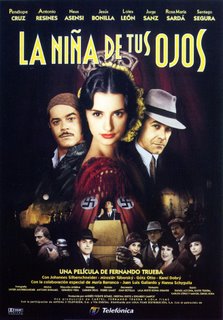La Niña de tus ojos (1998)
 La Niña de tus Ojos is an interesting but strange film about a troupe of Spanish cinema actors who go to Nazi Germany to make a musical. Interestingly, there were in fact a handful of Spanish films made in Nazi Germany during the Spanish Civil War. Franco’s National Department of Cinematography forced a lot of actors to go into exile. You know you live in a fascist regime when you have to travel to Nazi Germany to get a break from the censors. This particular group of exiled actors starts out blissfully ignorant and happy to be working. They know that the Nazis hate the Jews but they want no part of the war, stating that they are artists, not politicians or militants. Conscience drives them to speak up, however, and they end up harboring a Jewish prisoner and subsequently fleeing for their lives.
La Niña de tus Ojos is an interesting but strange film about a troupe of Spanish cinema actors who go to Nazi Germany to make a musical. Interestingly, there were in fact a handful of Spanish films made in Nazi Germany during the Spanish Civil War. Franco’s National Department of Cinematography forced a lot of actors to go into exile. You know you live in a fascist regime when you have to travel to Nazi Germany to get a break from the censors. This particular group of exiled actors starts out blissfully ignorant and happy to be working. They know that the Nazis hate the Jews but they want no part of the war, stating that they are artists, not politicians or militants. Conscience drives them to speak up, however, and they end up harboring a Jewish prisoner and subsequently fleeing for their lives. The film, directed by Fernando Trueba (most famous for the 1985 film Sé infiel y no mires con quién) is a bizarre mish mash of silly humor and shameless melodrama. That said, it is not really a bad film. The sets are gorgeous and the performances are decent. Particularly marvelous is Penelope Cruz as Macarena. I have never been a fan of Ms. Cruz, but she exhibits such wonderful timing and delivery in this particular film that I can say nothing but good things about her. There were a few moments that made me long for a gun to shoot out my telivision set a la Elvis, the most notable being a love scene in which Penelope Cruz and her Jewish fugitive lover have sex next to an unconscious Joseph Goebbels. Oh, and while we’re on the subject, I don’t really understand the point of portraying Goebbels as a bumbling oaf. He was a very frightening psychotic man, and a film that attempts to portray the horrors of the Nazi regime should depict him as such. All in all, it is a good production with some amusing and suspenseful moments, but nothing special. A lot of the humor is derived from the miscommunication between the Spanish and German languages, so a lot of the dialogue (poorly translated into English subtitles) may be lost on viewers. Audiences will either love or hate the references to other films, particularly Casablanca.


0 Comments:
Post a Comment
<< Home